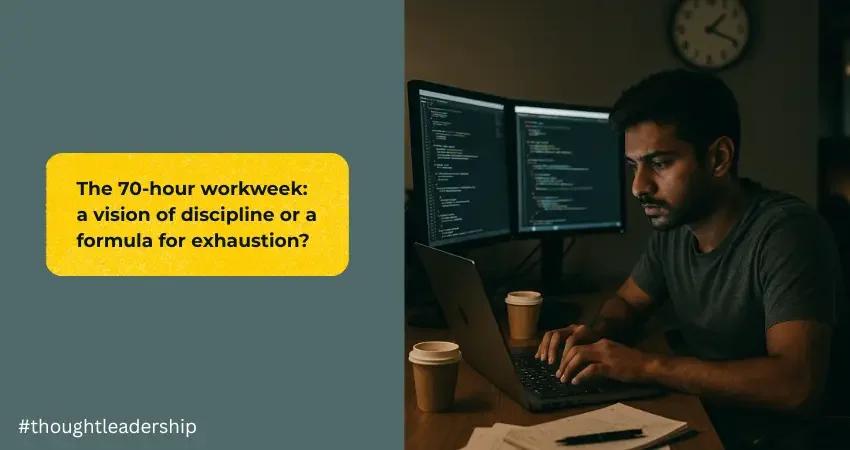
Work hard, or work smart? It’s the age-old dilemma that’s sparked fresh debate across India, fueled by none other than Infosys co-founder Narayana Murthy.
Table of Contents
ToggleAt the recent CNBC Global Leadership Summit, Murthy didn’t hold back. “I don’t believe in work-life balance,” he stated firmly. “I will take this belief to my grave.” His comments have reignited discussions about India’s work culture, especially as he referenced KV Kamath, the Independent Director and Non-Executive Chairman of Jio Financial Services. Kamath has previously asserted that India, a developing nation grappling with countless challenges, cannot afford the luxury of focusing on work-life balance.
Murthy’s Vision: The Argument for Relentless Hard Work
Murthy’s perspective isn’t without merit.
His stance is rooted in a vision of national progress that prioritizes hard work as the driving force behind economic growth. For decades, he has been a vocal advocate of a tireless work ethic, drawing from his experiences building Infosys from a modest start-up to a global IT giant. From his perspective, India, as a developing nation, cannot afford to adopt a culture of complacency. The global economy is highly competitive, and Murthy believes that extraordinary challenges require extraordinary efforts.
The basis of his argument stems from historical precedent: many developed nations have, at some point, undergone periods of rapid industrial and economic growth fueled by the hard work and sacrifices of their people. According to Murthy, if India wants to play on the world stage and catch up with global superpowers, then the nation’s young and vibrant workforce must be willing to go the extra mile. The demands of modern technology and global markets require a workforce that’s adaptable, determined, and committed to putting in the hours necessary to drive innovation and development.
Murthy’s call for a 70-hour workweek is also a reminder of the ethos that built early Indian enterprises—an era when work-life balance wasn’t a consideration, but survival and scaling up were paramount. He envisions an India where individuals push their boundaries, echoing a mindset of resilience and grit that propelled the country’s IT boom in the 1990s and early 2000s.
However, Murthy’s belief is more than just a nostalgic nod to the past. He sees it as a wake-up call for a generation that might be too comfortable in today’s environment. His argument implies that, in a world where technological disruption is the norm, only the hardest-working nations can lead and shape the future. For Murthy, economic growth is inextricably linked to a workforce that is relentless, focused, and unyielding in its pursuit of excellence.
Counterarguments: The Case for Balance and Smarter Work
However, as compelling as Murthy’s philosophy may sound, critics have raised significant concerns about the sustainability and effectiveness of such a work culture. Let’s dive deeper into the arguments against a 70-hour workweek:
1. The Importance of Work-Life Balance
The idea that long hours equate to higher productivity is increasingly being challenged. Countries like Denmark and Sweden, which emphasize work-life balance, consistently rank high in both happiness and productivity. Studies show that employees who have time to rest and engage in personal pursuits are often more focused, creative, and effective at work.
2. Quality vs. Quantity: The Science of Productivity
Several studies have debunked the myth that longer hours lead to better results. A Stanford University study revealed that productivity significantly declines after 50 hours per week, with a sharp drop after 55 hours. Employees working up to 70 hours a week produced no more than those working 55 hours, illustrating the law of diminishing returns.
Consider the case of Microsoft Japan’s Four-Day Workweek Experiment (2019), where the company saw a 40% increase in productivity. Employees worked fewer hours but were more efficient, happier, and more engaged. The lesson? Focused, high-quality work can often yield far better results than prolonged periods of fatigue and stress.
Additionally, cognitive research published in Psychological Bulletin emphasizes that our brains are wired for deep focus in short bursts. Sustained attention wanes after 90 to 120 minutes, making breaks essential for maintaining high performance. The takeaway is clear: More hours don’t necessarily mean better output.
3. The Aging Workforce, Productivity, and Health Concerns
This is a point I feel strongly about. As we age, our productivity naturally declines. The intense energy and stamina we enjoyed in our twenties aren’t sustainable forever. Once we cross 45, the risks of lifestyle diseases like diabetes, hypertension, and cardiovascular issues increase. Prolonged stress and long hours only exacerbate these health risks, leading to long-term consequences.
Neurological studies also reveal that cognitive functions such as memory, focus, and decision-making deteriorate with age. Forcing older employees into a 70-hour workweek could not only harm their well-being but also backfire on productivity. This doesn’t just affect individuals—it could strain healthcare resources and impact overall organizational efficiency.
Is it really worth sacrificing the health and well-being of a significant portion of the workforce for short-term gains? Or should we consider more sustainable work practices that support longevity, well-being, and peak performance?
The Future of Work: Finding a Middle Ground
Murthy’s comments highlight a clash between traditional views of hard work and contemporary understandings of productivity and well-being. Can India achieve economic progress without sacrificing the health and balance of its workforce? Perhaps the answer lies in a hybrid model: one that celebrates hard work but also acknowledges the science behind rest, efficiency, and mental health.
Work cultures around the world are shifting to emphasize flexible schedules, remote work options, and outcome-based performance. Maybe it’s time for India to consider a similar approach—where we work smarter, not just harder.
Join the Conversation
What do you think? Is Murthy right about needing a relentless work ethic for India’s growth, or is there a smarter way to move forward? Your insights are invaluable, and I’d love to hear your perspective.
For more discussion and to participate in our poll, head over to our LinkedIn newsletter. Let’s shape this conversation together and explore what the future of work should look like in India.
👉 Join the debate on LinkedIn and share your thoughts.
